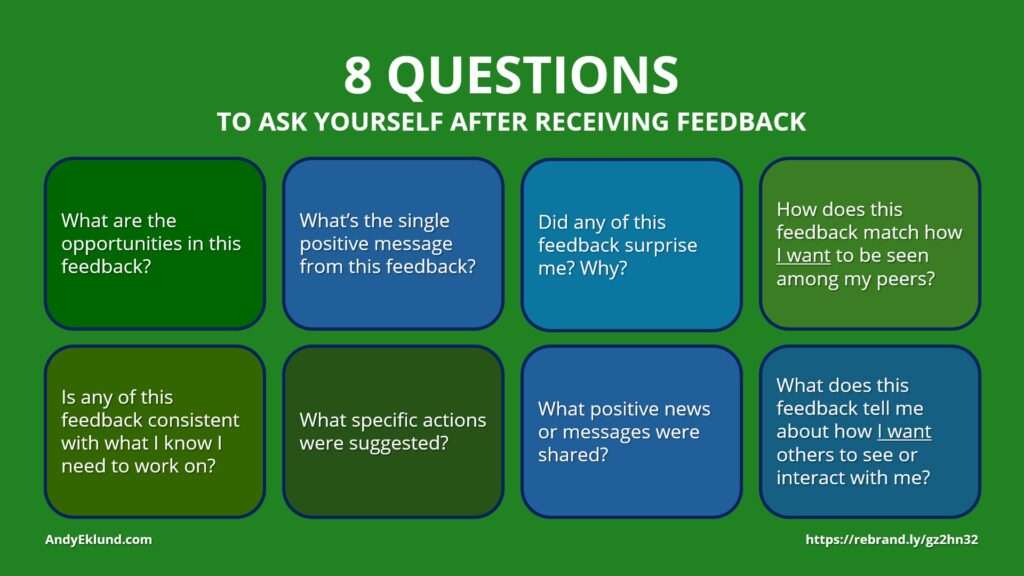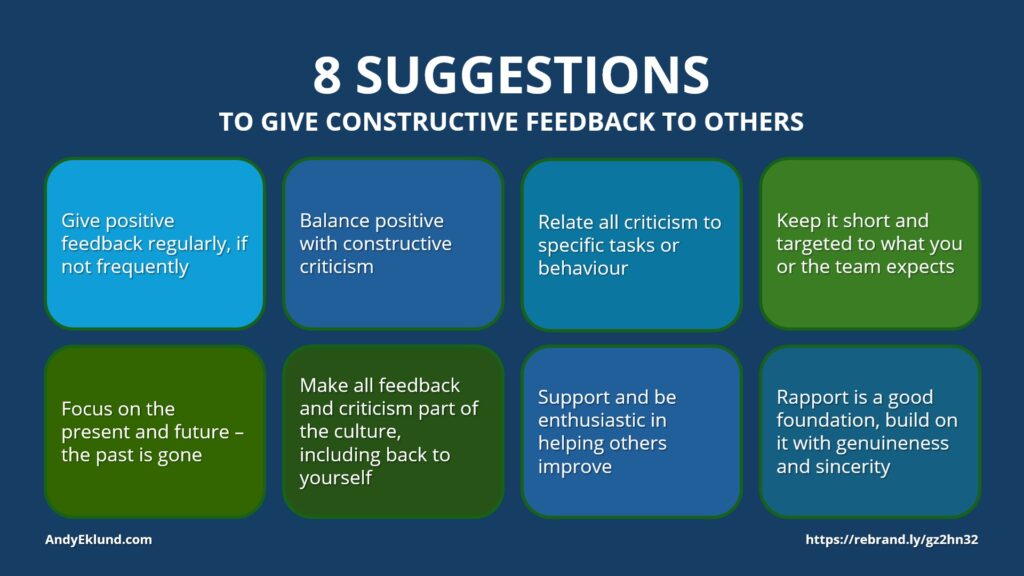As a wrap-up article on giving and receiving feedback, here are the best tips I’ve found over the years. Please feel to add any other thoughts in the Comments section below.
As a reminder, go here for the main article with links to related posts.
Giving and Receiving Feedback Tips for the Speaker
Above all else, remember the speaker’s goal is to encourage the other person to be (even) better, if not inspire their courage to accomplish their goals.
Have an informal conversation with the other party prior to the evaluation itself if it will help them prepare. But, don’t allow it to become the meeting itself.
- Encourage them to give adequate consideration to the feedback process.
- Suggest they speak to other people, both professional and personal.
- Offer to create an agenda, one which you’re happy to adapt to suit both of your performance goals, not your own agenda.
Ensure and maintain balance. Proper feedback should consist of three areas:
- Tasks or behaviours the person is doing right, or well – and why
- Tasks or behaviours the person is not doing well, or wrong – and why
- Tasks or behaviours they aren’t yet fully competent (This should be their primary focus for the next year.)
Find a place where both parties are comfortable. Remember: go somewhere where people don’t see both of you going into a conference room. No need to inspire gossip.
Address the person directly. Use eye contact. Above all, don’t interrupt when they need to talk.
Be sensitive to your delivery. Just because you prefer bluntness doesn’t mean the other person does.
Own what you say. Your words will come back at you at some point.
Show empathy and compassion. For example, it’s OK to make mistakes, but it’s also a waste of their time (not yours) to not learn from those mistakes.
Don’t use yourself as a personal example they should follow. You are not their messiah. You can use your own personal examples. But they should demonstrate “compassionate persistence.” (You screwed up, accepted what happened, and kept going.)
Use exploratory language. (‘How do you feel …’) No absolutes! (‘You always say …’)
Focus on the positive. Give specific examples. Be genuine with your praise. Tell them why you are happy they’re on your team. Express confidence in their abilities or decision-making.
Second, where negative, be explicit. Give specific examples. Be hard on the principles but soft on the person. Also, don’t apologise for being specific.
Suggest alternatives. The specific task or behaviour to address should not be a surprise to them, but nor is it up for discussion. This is a dynamic discussion. There should be a mutual discussion about a number of ways to improve, followed by mutual agreement about how to change in positive, measurable ways.
Below, you will find eight specific suggestions to give constructive feedback to others.
Giving and Receiving Feedback Tips for the Recipient
Above all else, remember the recipient’s goal is to gain specific understanding of how to improve your performance in the future, particularly to avoid wasting opportunities, time, energy and resources.
Appreciative fair feedback can build your sense of being valued, increasing both your effectiveness and personal confidence.
In other words, use the chart below to extract the most useful, most constructive feedback to improve.
Look directly at the person. Listen without comment. Interrupting often means you’re not 100% listening.
Once they’ve finished, don’t make statements. Ask questions for clarification.
Don’t accept, deny or rationalize. Don’t apologise.
If you feel your emotions rising, consider asking to stop the discussion. But don’t delay re-scheduling. You also may need to se
Walk away with grace, no matter how the session went. A simple statement like ‘You’ve given me something to think about, thank you’ says a lot about you to the manager.
Allow yourself at least a day – perhaps two – to think about what you’ve heard. When you return to the evaluation, remove all emotionally charged words: look only at the core message.
If a lot, reduce the evaluation down to a key number of messages. Focus on those which are explicit, action-oriented and do-able. If you can, do it yourself, or ask someone trustful to help. Also, consider asking someone you respect to review them, but the conversation should not be about the original evaluation. That’s the past.
If needed, ask other people around you to help you. This might be as simple as a reminder, a kind word, a suggestion so you – and they – know you’re trying to improve. Watch for, and jot down, real improvement.

Finally, click on this article about giving and receiving feedback: How To Take Critique Positively.
In addition to good thoughts about preparing for the meeting, the post suggests giving due consideration to the criticism itself (especially when it comes from someone you may not respect), and understanding the difference between self-confidence and self-deception.
As always, please feel free to add any other tips or suggestions on giving or receiving feedback in the Comments section below.
Click any button to jump to related posts on Feedback.



No comment yet, add your voice below!